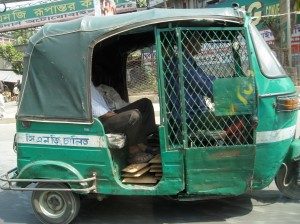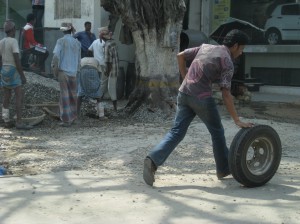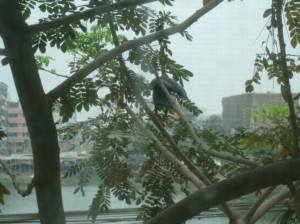So my cousins were telling me that this past election that just occurred in Bangladesh (early 2009) was in many ways comparable to Obama’s recent victory. People were out in the street on election day, cheering and dancing, oblivious to the threat of violence that has become so prevalent in politics, not only in Bangladesh, but pretty much everywhere. Even in the US, our joy and innocent cheer was subdued by the constant threat to the first black presidential candidate that covered the area (when we were around him) like the view from a secret service sniper net. I can’t describe the fear I felt as an Obama supporter, constantly praying (to my non-existent God) that nothing would happen to him. I can’t imagine the sorrow and depression that would permeate our nation and our world if that were to happen.
I’m not going to get on a whole political diatribe. We all know what politics begets. It has forever been associated with power, violence, and the suffering of the masses for the benefit of the few. That may not change in some time, if ever (until women take their true place as the master race, and us men are relegated to sex objects (bring it on!!!)), but perhaps there is hope. That word, hope, did not mean much to me before — it was a joke, a crutch for weaklings. But somehow, this transformative election and individual have given hope back to me — a person who in the past was the epitome of apathy, self-centeredness, and self-destructiveness.
But again — I digress. This post is really about why politics continues to be run by the same people. Why the masses around the world are so drawn to cults of personality that they would rather elect a despot they know than a stranger who’s actions might actually benefit their lives.
For example, in Bangladesh. To those of you who don’t know, I’ll attempt a brief explanation. Bangladesh used to have three major political parties. The Awami League (left), the Jatio Party (center), and BNP (right). Both right and center have gained political power through coups and assassinations, although Awami isn’t much better in terms of political subterfuge. Today, only left and right remain. Jatio has been eaten up by Awami, and right (BNP) has formed an alliance with far right (religious fundamentalists). This recent election was won by left. But here’s the big joke. The main political players in Bangladeshi politics for the past 30 years are all still heavily involved on today’s political stage, if they are still alive — otherwise their family members are. Family dynasties have formed, and power keeps changing hands between them. Can we really consider this democracy (And please remember that family dynasties are not something very unique to Bangladeshi politics before you attempt to judge us for our backwardness)? So Bangladeshi politics is starting to mimic more and more the politics of the US, or vice versa.
Except for the rampant — RAMPANT corruption. Its everywhere here — to the point that it has corrupted the national mindset. I was in hour 4 of an 8 hour conversation with a friend recently when I realized that us Bengalis have really changed as a people, our self-identity warped and twisted by corruption and greed. There used to be a time (although it may have been before I was born), when we used to fight for values — for our right to our language and culture. Now we kill for money and power. And this is seen as not only unavoidable, but even normal or respectable.
So how do we change it back? It definitely won’t be by handing power back and forth between the same tired old political parties. Bangladesh, like the US, needs someone transformative. Someone young, someone not associated with any of the political dynasties, someone full of idealism, someone incorruptible. Someone who believes that things can change for the better, and is willing to sacrifice self-interest for that change. So if you’re out there, transformative political candidate — out there on my friends list on FB — get in touch with me. I’ll help you run your campaign.
Filed under: Politics, asia, awami league, bangladesh, bangladeshi politics, BNP, corruption, jatio party, political dynasties, Politics



Recent Comments